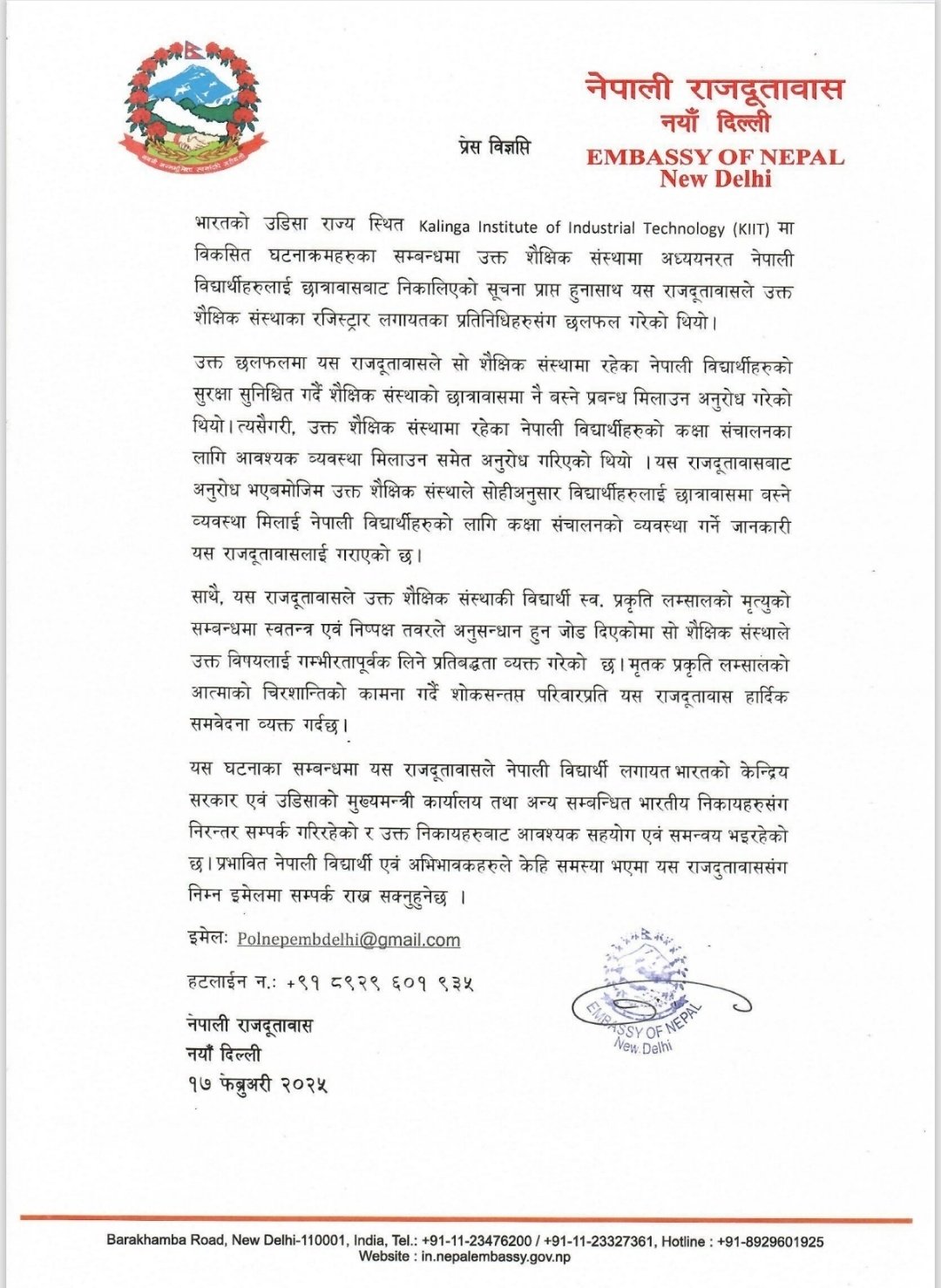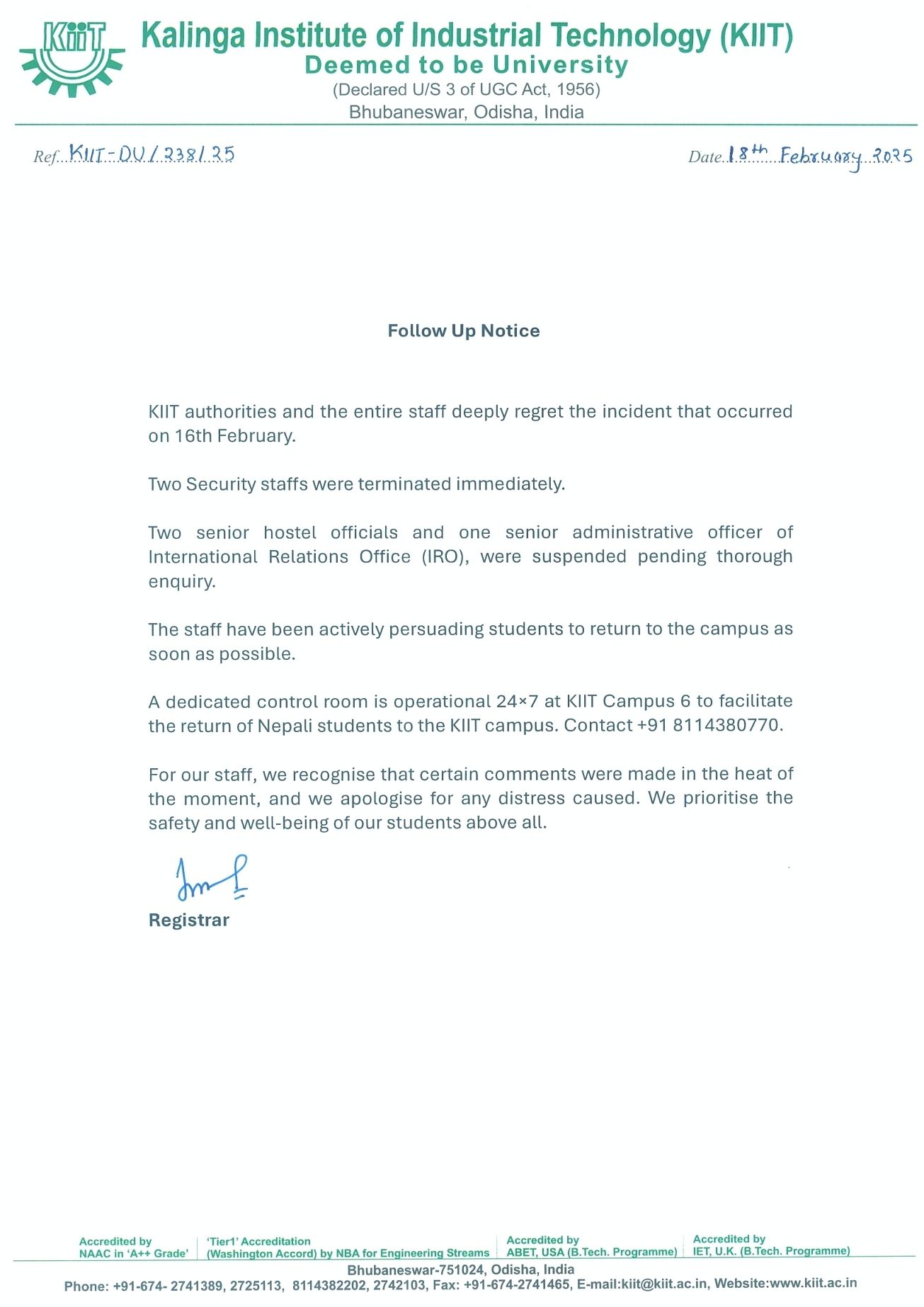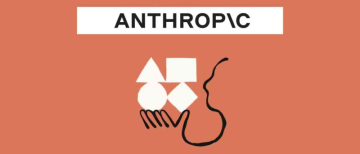When one life is taken, it doesn't just end for the person lost. It reverberates through families, communities, and even nations.
The tragic death of 20-year-old Nepali student Prakriti Lamsal at the Kalinga Institute of Industrial Technology (KIIT) in Bhubaneswar, Odisha, has sent shockwaves across India and Nepal. Lamsal, a third-year BTech student, was found dead in her hostel room on February 16, 2025. Allegations of harassment and blackmail by a fellow student have sparked protests, legal action, and diplomatic intervention. What began as a personal tragedy for Lamsal’s family quickly escalated into a national issue, drawing both local and international attention.
#WATCH | Odisha: A https://t.co/jHgpcuG1h1 third-year girl student from Nepal was found dead in KIIT University (Kalinga Institute of Industrial Technology) hostel in Bhubaneswar on 16th February. As per a notice issued by the University, the institute is hence closed sine die… pic.twitter.com/vVfgY140up— ANI (@ANI) February 17, 2025
A Tragic Incident Unfolds: Prakriti Lamsal’s Death
Prakriti Lamsal, a bright and promising student from Nepal, was pursuing her BTech in Computer Science at KIIT, one of Odisha’s premier educational institutions. Her life was cut short on the evening of February 16, when her body was found in her hostel room under what appeared to be tragic circumstances. Her cousin, Siddhant Sigdel, filed a complaint alleging that Lamsal had been subjected to harassment and blackmail by a male student, Advik Srivastava, a 21-year-old from Lucknow. Sigdel’s complaint suggested that the relentless mistreatment led Lamsal to take her own life.
Reports on social media hinted at a turbulent relationship between Lamsal and Srivastava. Some posts claimed that Lamsal had been blackmailed, with audio clips circulating of alleged conversations between the two. In one such clip, a male voice reportedly made threatening and abusive remarks toward Lamsal.
I condemn the deplorable behaviour of authorities in KIIT university. These ladies should explain why they are intimidating students.
A female student from Nepal has comitted Suicide. Investigation is on but why misbehave Students.
This is very unlikely of Indian behavior.… pic.twitter.com/OLVVWCTYys— Dr Lenin Mohanty (@DrLeninMohanty1) February 17, 2025
Accusations Against Advik Srivastava: The Alleged Harasser
Advik Srivastava has been identified as the main accused in Lamsal’s death. According to police, Srivastava allegedly blackmailed Lamsal, which may have contributed to her tragic decision. Following his arrest, Srivastava was charged under Section 108 of the Bharatiya Nyaya Sanhita (Indian Penal Code) for abetment of suicide.
Srivastava was detained outside the Biju Patnaik International Airport in Bhubaneswar after authorities learned he was attempting to leave the city. A flight ticket for a trip from Bhubaneswar to Kolkata, dated February 16, further raised suspicions about his intentions in the wake of Lamsal's death. Police have seized Lamsal's mobile phone and laptop for forensic examination to verify the allegations of blackmail.
#BREAKING: Nepali students protest outside the Indian Embassy in Kathmandu after mistreatment faced by students at KIIT University in Odisha, India. Prakriti Lamsal, a third-year B Tech student from Nepal, died by suicide at the University after facing molestation by a student. pic.twitter.com/iIfx78RaW5— Aditya Raj Kaul (@AdityaRajKaul) February 17, 2025
The Spark of Protests: Nepali Students Demand Justice
As news of Lamsal’s death spread, protests erupted on the KIIT campus. Hundreds of Nepali students gathered to demand justice for Lamsal, accusing the university authorities of failing to act on her complaints about harassment. According to the students, Lamsal had reported her concerns to the International Relations Office (IRO) of KIIT, but the administration had only issued a verbal warning to Srivastava, without taking further action.
Tensions escalated when university authorities, in an attempt to quell the protests, ordered all Nepali students to vacate the campus. Students were forced into buses and sent to Cuttack Railway Station, 30 kilometers away, without proper arrangements. Some students even lacked train tickets, while others had ongoing exams.
In addition to these complaints, there were allegations of racially insensitive remarks by university officials. One remark, reportedly made by a KIIT staff member, compared the university’s spending on students to the entire national budget of Nepal.

Diplomatic Tensions and Nepal’s Intervention
The forced eviction of Nepali students quickly transformed the situation into a diplomatic issue, with Nepal's Prime Minister, KP Sharma Oli, stepping in to demand justice and accountability. In a public statement, PM Oli criticized the university’s actions and called on the Indian government to intervene. The Nepalese Embassy in New Delhi sent two officers to counsel affected students and ensure their safety.
Under immense diplomatic pressure, the Odisha government intervened, directing KIIT to reverse its decision and allow the students to return to the campus. The university issued a statement inviting the students back, and the Nepalese Embassy assured that students could choose to stay in their hostel or return home. Odisha’s Higher Education Minister, Suryabanshi Suraj, also criticized the eviction and assured the public that the matter was being treated with the utmost seriousness.
Our Embassy in New Delhi has dispatched two officers to counsel Nepali students affected in Odisha.
Additionally, arrangements have been made to ensure they have the option to either remain in their hostel or return home, based on their preference. #Nepal #Odisha— K P Sharma Oli (@kpsharmaoli) February 17, 2025
KIIT's Response: A Shift in Approach
Initially, KIIT had taken a firm stance, insisting that Lamsal’s death may have been a result of a personal dispute, as she was allegedly in a relationship with Srivastava. However, this theory has been strongly contested by Lamsal's family and the protesting students, who maintain that harassment and blackmail were significant factors leading to her death.
After diplomatic and public backlash, the university issued a statement acknowledging the severity of the situation and urging Nepali students to return to campus. The university also promised to take all necessary steps to restore normalcy and resume academic activities. The Odisha government’s intervention has ensured that Nepali students are now being given the choice to stay or return, in accordance with their preferences.

The Investigation: Authorities Scrutinize the Evidence
The police investigation into Lamsal’s death continues, with a focus on examining the evidence gathered from Lamsal's phone and laptop. The authorities are working to substantiate claims of blackmail and harassment by Srivastava. The police are also investigating whether other students or university staff may have played a role in failing to address Lamsal’s complaints.
As of now, Srivastava remains in custody, and his arrest under charges of abetment to suicide has raised questions about the university’s responsibility in preventing such tragic incidents.
#WATCH | Nepal: Members of the students wing of the Nepali Congress party stage a protest in Kathmandu, demanding justice for the Nepali student who died by suicide after being allegedly harassed by a third-year Mechanical engineering student of KIIT University, Odisha.
The… pic.twitter.com/l34H7j2NoD— ANI (@ANI) February 18, 2025
Moving Forward: Justice and Accountability
The death of Prakriti Lamsal has become a symbol of the larger issues of harassment, negligence, and inadequate action by institutions when it comes to protecting students. While the investigation continues, the tragedy has already highlighted the importance of swift and effective response systems within universities to address harassment claims.
For Lamsal’s family, the loss is immeasurable. For Nepali students in India, it is a stark reminder of the vulnerabilities they face in a foreign land. The road to justice for Lamsal may be long, but the intervention of both the Nepalese and Indian governments demonstrates the urgency and seriousness with which the case is being handled.
Key Takeaways:
-
Prakriti Lamsal, a Nepali student at KIIT, died by suicide on February 16, 2025.
-
Allegations of harassment and blackmail by fellow student Advik Srivastava led to her tragic death.
-
The Nepali student community at KIIT protested, accusing the university of failing to act on Lamsal’s complaints.
-
Diplomatic tensions rose as Nepal’s Prime Minister intervened, urging the Indian government to address the issue.
-
KIIT reversed its decision to evict Nepali students after strong diplomatic pressure.
-
The investigation into Lamsal’s death is ongoing, with authorities scrutinizing digital evidence to substantiate the blackmail claims.
As the case unfolds, the central question remains: will justice prevail for Prakriti Lamsal, and will this incident spark meaningful changes in how universities handle student complaints, particularly those of harassment?
With inputs from agencies
Image Source: Multiple agencies
© Copyright 2024. All Rights Reserved Powered by Vygr Media.

















